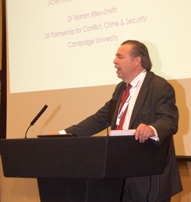Securing Business, Protecting the Future was the title of Consec 2014, the annual conference of the Association of Security Consultants (ASC). Here’s a digest of the day.
The day highlighted the need for a true analysis of risks and necessary solutions, rather than relying on simplistic reports and common assumptions; developing effective strategies to tackle cyber threats; and the importance of being able to rely on quality products and service in the fight against crime.
Over 150 delegates representing security suppliers and end-users attended the conference, chaired by Security Industry Authority chair Elizabeth France CBE, and exhibition.
In his opening keynote address, Prof Michael Clarke, director general at the defence and security think-tank Royal United Services Institute (RUSI), outlined factors influencing global threats. These included: demographic trends; climatic events resulting in population movement; regional tensions; the growth of virtual communication; a significant level of financial assets being out of reach of state jurisdiction; economic hardship and resulting migration; the take-over of liberal revolution by fundamentalist elements.
Paul Easter, managing director at Harquebus Ltd and 2014 Imbert prize winner, sought to dispel some misconceptions about terrorist capabilities, saying they were typically technologically conventional, had generally not succeeded in using the internet as a cyber weapon, and were a long way off being able to pose a nuclear threat. Ability to use more advanced methods was dependent on state assistance which was often non-existent or limited.
Sue Seaby, director at SAS Security Risk Service, said that tackling the cyber threat should be done as part of an integrated plan for dealing with all threats and involving all risk disciplines, rather than treating it as something special.
She added that boards needed to be educated against being swayed on risk policy dependent on media coverage at any time. She also felt there should be greater recognition of the scale of the insider threat to information security: 80 to 85 per cent of all data breaches were committed by staff – inadvertently or deliberately.
Both Sue Seaby and Jane Attwood of the John Taylor International Partnership focused on the importance of organisations ensuring their suppliers – as well as their employees – followed appropriate procedures to minimise risks.
Jane Attwood, who is also a member of the London Chamber of Commerce and Industry (LCCI) Defence and Security Committee, outlined the findings of recent LCCI research on cyber security. More than half, 54 per cent of London businesses had been a victim of cyber crime in the last 12 month. The main barriers to improved protection were the perceived high cost (34pc of respondents) and a lack of awareness of threats (30pc). LCCI recommendations included making it simpler for businesses to know where to go for advice, and the availability of the Innovation Voucher for cyber security on a continuous basis to help SMEs bring in outside expertise.
Dr Tristram Riley-Smith, pictured, external champion to the UK Partnership for Conflict, Crime and Security Research, Cambridge University, said that, despite a perception that information security was all about technology, probably the most important element in cyber research focuses on human behaviour as a high proportion of risks could be minimised if best practice was followed.
The partnership is a national research programme aimed at improving our understanding of current and future security challenges; to date it has worked on over 1200 projects. Dr Riley-Smith’s mission is “to get value extracted from the university world and delivered to the people who can do something with it”.
He cited a number of examples, including making the link between ‘lucky imaging’ techniques from astronomy and improving resolution quality of surveillance systems for crime prevention and detection.
It is estimated that the global security market will have risen from £410bn in 2012 to £571bn by 2016. Dr Riley-Smith said that the goal was for the UK share of security exports to rise from 4pc to 8pc by 2020.
Stephen Phipson CBE, director of security industry engagement at the Home Office, outlined his work supporting activities across Government, led by UKTI, to promote security exports; this had been able to build on the UK’s delivery of a safe London 2012 Games, and ran alongside his responsibilities co-ordinating the interaction between Government and UK’s security industry. He stressed the importance of being able to rely on high standards from the organisations the Government’s export initiatives were supporting.
Di Thomas, membership engagement manager at the Security Institute, continued the theme of standards with her summary of the Chartered Security Professional certification scheme. The 75th practitioner to gain this status was Bob Martin, an ASC board member, and his achievement was marked with an official certificate presentation at CONSEC.
Allan Hildage, ASC chairman said after the event: “This year’s CONSEC proved to be yet another informative and worthwhile conference where delegates were fortunate to hear some outstanding presentations from security and risk expert leaders from Government, academia and industry. Our team of organisers are to be congratulated for arranging such a successful event.”
The ASC has supported the Women in Security Awards since their inception in 2011 and was pleased to host the awards dinner with CONSEC. The next Consec runs on October 15, 2015. Visit http://www.securityconsultants.org.uk.










